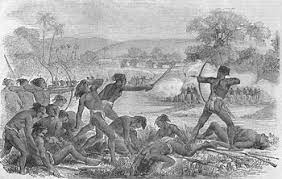The Ulgulan Movement was a significant tribal uprising led by the charismatic leader Birsa Munda in the late 19th century. Born into the Munda tribe in present-day Jharkhand, Birsa was deeply moved by the exploitation and oppression faced by India’s tribal communities under British colonial rule. The Ulgulan Movement was a powerful expression of resistance against the unjust policies of the British administration and the exploitation of indigenous peoples.

Table of Contents
Causes of the Ulgulan Movement
The Ulgulan Movement was fueled by various socio-economic and political factors that adversely affected India’s tribal communities:
- Land Dispossession: British colonial policies, such as the introduction of the Zamindari system, led to the dispossession of tribal lands, pushing indigenous communities into poverty and destitution.
- Forced Labor and Indigo Cultivation: The British forced tribal farmers into indentured labor, cultivating cash crops like indigo, which perpetuated economic exploitation and debt bondage.
- Cultural Erosion: British rule disrupted tribal social and cultural structures, leading to the erosion of traditional practices and customs.
- Exploitative Zamindari System: The zamindari system, with exploitative intermediaries between the British administration and the tribal communities, exacerbated the already oppressive conditions.
Events of the Ulgulan Movement
The Ulgulan Movement began in 1899 when Birsa Munda emerged as a charismatic leader, galvanizing the tribal communities to rise against their oppressors. The movement spread rapidly, gaining support from various tribal groups, including the Oraon, Mundas, Ho, and others.
Birsa Munda’s spiritual and visionary leadership resonated with the masses. He blended traditional tribal beliefs and customs with a call for social and political change, urging the people to reclaim their rights and dignity.
The movement adopted non-violent civil disobedience, strikes, and protests as methods of resistance. Tribal communities, armed with traditional weapons, confronted British forces and oppressive landlords, demanding justice and the return of their ancestral lands.
Impact and Suppression
The movement posed a significant challenge to the British administration and the zamindars who profited from the exploitation of tribal communities. The movement united various tribal groups, fostering a sense of solidarity among India’s indigenous peoples.
The British authorities responded with brutal force, attempting to suppress the uprising. Birsa Munda and his followers faced arrests, imprisonment, and violence at the hands of the colonial forces.
Legacy of the Ulgulan Movement
Though the movement was ultimately suppressed, its legacy endures as a symbol of indigenous resistance and the struggle for tribal rights in India. Birsa Munda’s vision of a united tribal front fighting against injustice and oppression has inspired subsequent generations of activists and leaders.
The Ulgulan Movement also paved the way for future movements advocating for the rights of India’s tribal communities. It highlighted the importance of preserving indigenous cultural heritage and identity while demanding social and economic justice.
Commemorations and Recognition
The Indian government declared Birsa Munda’s birth anniversary, November 15, as “Birsa Munda Jayanti,” honoring his contributions to the nation’s history.
Numerous statues, memorials, and institutions have been established to honor Birsa Munda and recognize the significance of the Ulgulan Movement in India’s freedom struggle.
Conclusion
The Ulgulan Movement led by Birsa Munda remains an inspiring chapter in India’s history of indigenous resistance against colonial oppression. It serves as a powerful reminder of the importance of upholding the rights, dignity, and cultural heritage of India’s tribal communities. The legacy of the Ulgulan Movement continues to inspire the quest for social justice and equality, promoting inclusivity and respect for all citizens, regardless of their social or tribal background. Birsa Munda’s visionary leadership and the Ulgulan Movement stand as an enduring testament to the indomitable spirit of India’s tribal communities in their fight for freedom and empowerment.
Important Links